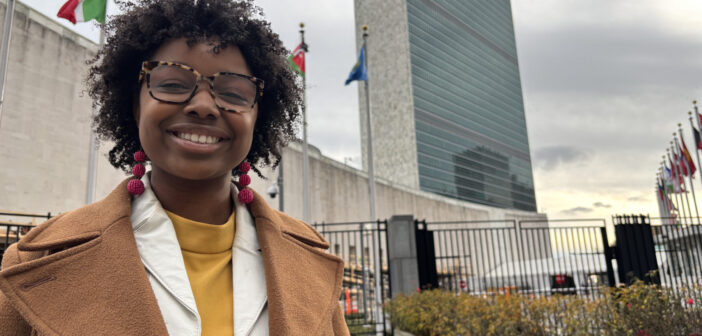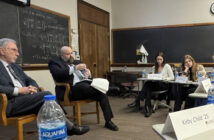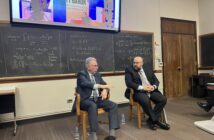Rhema Hooper, ‘26, was selected to speak at the UN’s annual “Human Rights Day,” which took place at the nation’s UN headquarters in Manhattan, New York and was live-streamed on WebTV.
At the Dec. 4 event — along with other guest speakers and diplomats — Hooper spoke on the issue of child labor in cobalt mining, an element found in most daily-use technology.
Hooper said cobalt mining practices are important for college-aged students and other members of Gen Z.
“All of our pieces of technology — like laptops, iPads and computers — heavily rely upon cobalt for their sources of rechargeable batteries.”
Hooper has been independently working on a project surrounding the Democratic Republic of Congo, which she said was the basis of her speech. However, Hooper wanted to make her child labor case broader for the UN, so she did not specifically touch on this in her speech.
“At the United Nations, you never want to single out one country, so I could not really elaborate on my independent research project,” Hooper said. “But that is what what I have been working on for nearly a year now.”
Hooper said that the main point she wanted listeners to take away from her speech was the lack of education that surrounds unfair mining practices, as she believes the issue stems in not addressing why education around Cobalt mining is so important.
Hooper said she wanted to answer questions about the limited research on this issue.
She said after the event was over, she wished more audience members asked questions surrounding education and her current personal studies.
Colin McEvoy, the communications manager for Lehigh University’s Office of International Affairs, attended the event in person.
He said there were between 50 and 100 people at the event in total, which gave Hooper an uncommon platform.
“It is not every day that a college student is able to speak to the UN, let alone address such important issues such as protection of children in war zones and the dangers of child labor practices in cobalt mining,” Mccavoy said. “Lehigh University has partnered with the UN for 19 years, and was the 6th university to establish itself as an NGO (non-governmental organization).”
McEvoy said this is and the United Nations Academic Impact Program is part of why Hooper was selected to speak at the event.
McEvoy said he was asked if he had any recommendations for a student speaker before the event.
“Rhema was the one who immediately came to mind, because of the area that she’s studying,” he said.
Hooper is currently studying for a bachelor of arts in global health with a minor in molecular biology. She intends to ultimately pursue medicine as a practicing physician for refugee camps in Southwest Asia and North Africa.
McEvoy said Lehigh University’s UN partnership provides a multitude of opportunities similar to this to Lehigh students, including other opportunities to speak, internships, and travel opportunities.
Since the beginning of Lehigh’s UN program, Lehigh has had over 20 students present and earn badges for the UN.
Bill Hunter, the director of the office of fellowship and advising, is the head of the program and was also present at the event.
Over the past 19 years, he said the university has had nearly 21,000 faculty, staff and students directly engaged in UN-related programs.
“We are at the point now where we can guarantee that every student who comes on campus can have a significant and meaningful interaction with the United Nations,” Hunter said.
He said he has worked with young people for 30 years, and he is impressed by Hooper and her mission.
“She is a woman with a cause, she is incredible,” Hunter said.






Comment policy
Comments posted to The Brown and White website are reviewed by a moderator before being approved. Incendiary speech or harassing language, including comments targeted at individuals, may be deemed unacceptable and not published. Spam and other soliciting will also be declined.
The Brown and White also reserves the right to not publish entirely anonymous comments.